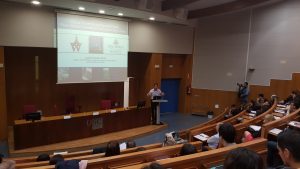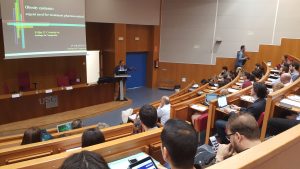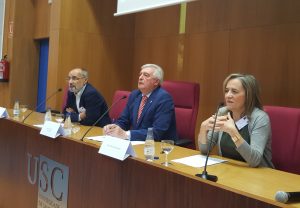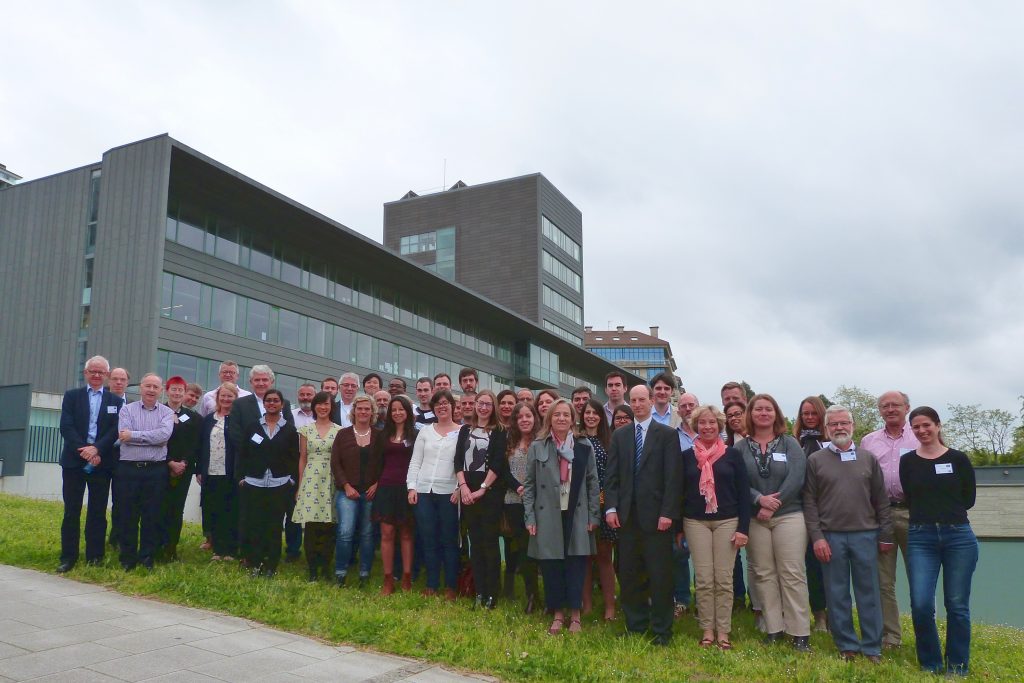- The European consortium “TRANS-INT” finishes the project “New oral nanomedicines: transporting therapeutic macromolecules across the intestinal barrier”.
- The TRANS-INT consortium has organized its final meeting at the University of Santiago de Compostela, on April 24-26. Over 50 researchers who participate in the project will attend the meeting and discuss the most relevant achievements of the project.
- The TRANS-INT consortium, coordinated by the University of Santiago de Compostela (USC), comprises 16 partners from 15 institutions from all over Europe, universities (USC, Fundacio Institut De Recerca Biomedica, Université d’Angers, University College London, University College Dublin, Université Catholique de Louvain, Uppsala Universitet, University College Cork, Istituto Oncologico Veneto, Medizinische Hochschule Hannover), the Commissariat a L’Energie Atomique et aux Energies Alternatives (France), the research centre ECAMRICERT (Italy), the companies Seroscience (Hungary), Sigmoid Pharma Limited (Ireland) and the multinational pharmaceutical company Sanofi.
- Throughout the five years of the project, 11 million euros were invested, eight of which was provided by the European Commission.
- The public-private TRANS-INT European consortium has fully studied the way in which certain nanomaterials interact with the gastrointestinal tract upon their oral administration and their use as carriers of therapeutic biomolecules such as peptides and proteins throughout the intestinal mucosa.
- The advances achieved allow the development of therapeutic strategies that may be interesting for the systemic treatment of diseases such as diabetes, obesity and chronic pain, and for the local treatment of inflammatory bowel diseases.
- More information about the TRANS-INT consortium and the results of the project can be found at: http://www.trans-int.eu
Santiago de Compostela, April 20, 2017. The TRANS-INT project aimed at fully studying the interaction of certain nanomaterials with the gastrointestinal tract upon oral administration. This study has allowed the evaluation of those nanomaterials as carriers of therapeutic biomolecules, such as peptides and proteins, through the intestinal mucosa. The advances achieved allow the development of therapeutic strategies that may be interesting for the systemic treatment of diseases such as diabetes, obesity and chronic pain, as well as for the local treatment of inflammatory bowel diseases.
All of these achievements will be discussed during the final meeting of the TRANS-INT consortium, which will take place in Santiago de Compostela on April 24-26, with the attendance of over 50 researchers who are part of the project. Representatives of the European Commission will also attend this meeting. Dr. J. Hanes from the Johns Hopkins University (USA) and Dr. Felipe Casanueva from CHUS (Santiago de Compostela) will be present as invited speakers and external consultants.
European public-private consortium
The project started in 2012 and lasted for five years. Throughout its development, around 11 million euros were invested, with the large majority of this being provided by the European Commission through the call “Nanosciences, nanotechnologies, materials and new production technologies” – NMP (NMP.2011.1.2-2 New targeted therapy using nanotechnology for transport of macro-molecules across biological barriers) of the 7th European Framework Programme.
The European public-private consortium TRANS-INT, coordinated by the University of Santiago de Compostela (USC), comprises 16 partners from 15 institutions from all over Europe, universities (USC, Fundacio Institut De Recerca Biomedica, Université d’Angers, University College London, University College Dublin, Université Catholique de Louvain, Uppsala Universitet, University College Cork, Istituto Oncologico Veneto, Medizinische Hochschule Hannover), the Commissariat a L’Energie Atomique et aux Energies Alternatives (France), the research centre ECAMRICERT (Italy), the companies Seroscience (Hungary), Sigmoid Pharma Limited (Ireland) and the multinational pharmaceutical company Sanofi. This consortium includes several centres with broad experience in pharmaceutical nanotechnology and its application in the development of nanomedicines, as well as in medicinal chemistry, immunology and toxicology. Moreover, Sanofi has significantly contributed to the project by providing biomolecules and validating the potential therapies developed in the consortium.
The project has been coordinated by the University of Santiago the Compostela, through the nanomedicine research lab led by Prof. M. J. Alonso. According to Prof. Alonso, “the experience has been very positive, since we have created a powerful network of collaborations that led to numerous synergies and, consequently, to widely validated results useful for the development of new therapies”.
Results
The results achieved in the project provide an important overview on the pathway that should be followed in the development of innovative oral drugs based on biomolecules, such as peptides and proteins. The achievements of this consortium include the generation of broad knowledge about the potential of nanomaterials for the formulation of therapeutic peptides and proteins, as well as the development of new possible candidates for the treatment of highly incident pathologies such as diabetes, obesity, chronic pain or inflammatory bowel diseases.
The results of this project will be disclosed in over 400 scientific documents, including four patent applications. Moreover, TRANS-INT has contributed to the training of 30 young researchers, eight of which have done their PhD thesis within the project. These young researchers also had the opportunity to train in different institutions belonging to the consortium.
USC presence in the TRANS-INT project:
Apart from Prof. Alonso, who coordinated the project, the research group led by Prof. Carlos Dieguez, also at CIMUS research centre, is participating in this project. Information about these research groups can be found at:
https://www.usc.gal/grupos/mjalonsolab/
More information:




